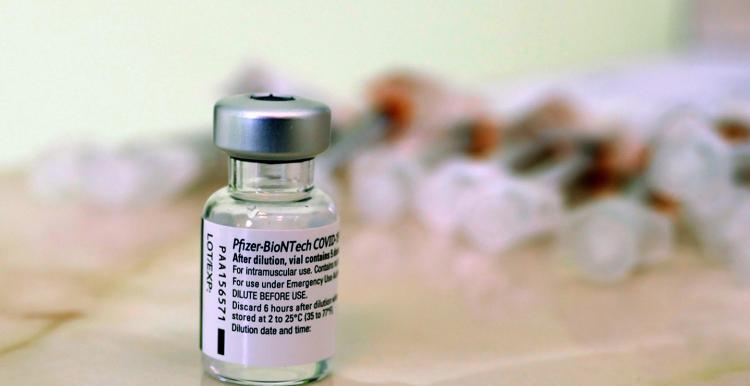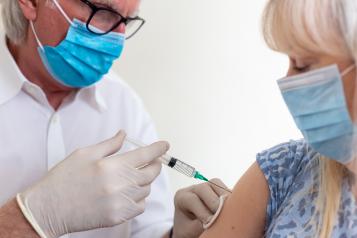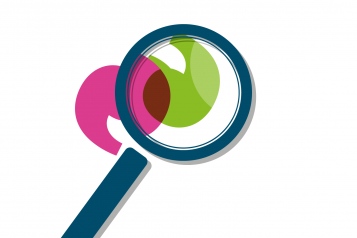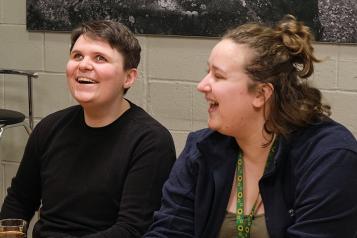Covid Vaccinations: Community Q & A

This resource comes from our 4 February information event, 'Rolling out the Covid-19 vaccination programme in Islington'. It is not intended to cover all aspects of the coronavirus vaccination programme. It is a record of questions asked and answered during a conversation that took place between residents and the commissioners who oversee services on their behalf.
We have also produced a guide to the vaccination programme in Islington. Because the situation is fast-moving and information can go out of date quickly, visit the North Central London NHS website for the latest information on COVID-19.
We’ve been told that two weeks after the first dose of the vaccine we will have good protection from covid, but Tim Spector [a prominent epidemiologist] also said that we will have no protection until that time - two weeks after the first dose for the Pfizer vaccine and at least three weeks after the first dose for AstraZeneca. Could you say something about this?
Yes, this is right. You will have no protection until two or three weeks, depending on which vaccine you are given, so it’s still very important that you continue to observe social distancing. Another reason for doing so is that we’re still not sure that being vaccinated stops you from transmitting the virus (though evidence collected so far is encouraging).
Since you have to wait for one week after the second dose for full protection that’s at least three months until you’ve got a proper level of protection, from the time of your first jab.
It’s quite confusing being contacted by my GP practice and by the National Booking Service each offering me a vaccine appointment.
Unfortunately, it is quite confusing. Your GP practice will be inviting you to an appointment at a local GP centre, either Hanley Road or Bingfield. The national programme offers appointments at larger sites (so for Islington that’s the Arc Centre and hopefully by mid-February the Business Design Centre) and at hospital sites. The two systems aren’t able to talk to each other which is why you can get offered two appointments. It does mean you can choose the one that’s easiest for you. Try not to cancel appointments that have already been made if at all possible.
Can I still get the jab if I’m not registered at a GP? [The lists of people to vaccinate are drawn from GP patient lists] What if I’m street homeless, or have had a traumatic experience with a GP and am now unregistered?
We’re doing work on this and putting on services for the people we know about who aren’t on GP lists, but the vaccine isn’t being offered at walk-in services so you do have to be offered an appointment. There will be some people who aren’t on GP lists who we don’t know about.
Healthwatch will follow up on this.
If I’ve tested positive for Covid and done my ten days of self-isolation is it ok to go to my vaccine appointment?
If you have tested positive for Covid you need to wait four weeks from the time of your positive test before you can have the vaccine. However, if you’ve had to isolate, but not had symptoms or a positive test, you can get the vaccination as soon as your isolation period is over.
Have any of the Covid vaccinations been tested on animals?
Yes, the vaccines have been tested on animals to see if they are safe and to see if they work. The Pfizer vaccine, for example, was tested on mice and macaque monkeys. Animal testing is usual for all vaccines. What’s different about the Covid vaccines is that human trials started much earlier than they usually do.
Shouldn’t people working with children and unpaid carers be more highly prioritised to receive the vaccine?
Priority is assigned based on a person’s vulnerability to the virus, rather than how likely they are to catch it. However once the people in the existing priority groups have all been offered the vaccine, a national decision will be taken about the groups of people who will be prioritised next.
However, paid carers are being prioritised already and unpaid carers in the same household are getting vaccinated as well if they come along at the same time as the person they care for. This is a decision that was taken locally at North Central London level.
I’m an unpaid carer but I don’t live with the person I care for. Can I go along with them to get the vaccine? I do have regular contact with them and I am their registered carer.
There are some grey areas but what you can do is discuss it with the staff at the vaccination site. My expectation is that if it is possible for them to offer you the vaccine at the same time they will probably say yes. However, they do need to make sure they have sufficient vaccine for everyone who has an appointment that day.
What if the vulnerable person I care for isn’t over 70?
This is a grey area but probably not, not until 15th February onwards.
What strategies are in place to provide factual information about the vaccine to communities that are either mistrustful of the vaccine or that statutory services find hard to reach?
We’re working on this. Be assured that we’re working with local organisations that interact with those communities.
There are also videos and materials in other languages that we will share after this meeting.
My GP told me a couple of weeks ago that the supply of vaccines into the borough is really chaotic. Also at Hanley Road people from at-risk groups from East London have been in for vaccinations. I am not objecting to this at all but am wondering if Islington is getting a regular supply of the vaccines and whether that process is well managed?
Anytime from two to ten days in advance, we are told how much of the vaccine and what sort we are receiving. We definitely have enough to vaccinate everyone in our priority groups.
What about the second dose of the vaccines? Are we confident that it will be here in a timely manner?
Yes, we are. The process of distribution is changing for the second dose. We will be able to drive the process, telling the central distribution network how much vaccine and of what type we need (rather than just getting what we’re given).
Convincing members of my community to get the vaccine isn’t just a matter of preparing a resource. We have to see it. I only found out about this meeting by accident for example. There’s also a massive time lag. It took three or four days to convince my Grandma to have the vaccine. The information needs to be translated and assimilated. It takes time. There have always been problems in the past. The Somali community doesn’t get well informed. What is going to be different this time? My sister got an invitation for the vaccine by text at short notice because they had excess on the day. She said no. Why did she say no? It’s going to be a difficult challenge.
You’re absolutely right. Yes, there are videos and materials but we would be bad at our jobs if we didn’t realise we won’t reach all communities. We want to work with community advocates.
The most persuasive voices are those from your own community who have already had the vaccine. Get your grandma to tell her friends that it’s good.
Don’t worry she’s doing that already.
The CCG and Healthwatch Islington will be working with local community groups
Are the vaccines safe for people with chemical and environmental allergies and who is the best person to discuss this with?
Yes they are. But if you have a known allergy to any of the ingredients, and there aren’t many ingredients in the vaccine, then you shouldn’t take it. The best person to discuss this with is your GP or pharmacist. We can share a list of the ingredients with you.
Can you go private to get the vaccine if you have asthma but are not being prioritised?
No the vaccine is not available privately.
Are housebound people getting vaccinated?
Yes, as of Monday last week we began vaccinating this cohort. The Whittington Health district nurses are doing this using the lists of housebound patients held by GP surgeries. They’ve done the lists from half of the practices so far.
What if I live in Islington but my GP is in another borough?
If your GP is in Camden you’ll be invited to a GP centre in Camden. Alternatively, you can wait for an invitation from the National Booking Service and go to the Arc Centre.
Is it possible to opt in to a group making themselves available at short notice for leftover vaccines at the end of the day?
No, it isn’t. It’s tricky because the vaccination centres won’t know till near the end of the day when they are closing so we are prioritising carers and partners of a similar age rather maintaining such a list.
I’d like some clarity on asthma. If we have asthma severe enough to cause us to get really ill from a regular cold, can we go up the list? Similarly what if we are severely overweight?
If you are under 65 with a long-term health condition then you are in cohort 6. This means you have to wait until the vaccine has been offered to everybody aged 65 and over. Within the next couple of weeks, we’re hoping to begin offering vaccinations to people under 65 with a long-term health condition.
If you have had the flu jab it is recommended that you wait a week before having the covid vaccination.
Current advice is to leave at least 7 days between the flu vaccine and Covid vaccine, although if there is the option to have the flu vaccine at the same venue as the Covid vaccine, then they can be administered at the same time. If we are advised to have a booster Covid vaccine in the autumn, then it is likely that this will be administered at the same time as the flu vaccine.
I saw on the news that there are plans to offer the vaccine 24 hours a day.
No there are no plans to do this in Islington. We just don’t think that people want to go for a vaccination at 3 in the morning. We already see a sizeable drop-off in people going for the vaccine on a Sunday, for example. Currently, we offer the vaccination between 8am and 8pm, seven days per week.
Why aren’t there more GP sites?
Only 2 or 3 premises were suitable as they need to have the space to offer vaccinations whilst still being able to operate as a regular GP practice. In Islington space is at a premium and GP premises are small. Most buildings aren’t suitable.
What about Hornsey Rise or Arsenal Football Club?
We’ve done extensive work on this so we’re confident we’ve got the right sites. We aren’t allowed to distribute vaccines to individual practices so had to nominate two centres. It’s also difficult to transport vaccines between sites as they are quite fragile (hence the limited number of centres).
In addition, some council-owned sites are being used as testing centres and you can’t mix the two.
How does the vaccine affect other medication I’m taking?
Vaccines don’t interact with other medications at all. And if you’re immune system is suppressed you should definitely have the vaccine.
Do we get a choice of vaccine?
No – because the local NHS in Islington doesn’t get a choice of which vaccines we are sent.
What about the second dose? Will we get the same one we got the first time?
Yes. All the messages I’m getting confirm this. In the real world, both vaccines will give you very good protection against Covid. There is news about a trial using different vaccines for the first and second dose but that’s just a trial at this stage and we’ll need to wait at least three to six months for the results.
Will we need to have the Covid vaccine annually? Since vaccines need adjusting for new strains is it likely we’ll all need to be vaccinated again.
We don’t know yet. It may end up like the flu vaccine where you get a booster each year but we don’t know at the moment. We do know that the current vaccines are very good against the Kent strain.
If a vaccine that provides 90% protection only provides 60% protection against a new strain, in the real world that is still great protection. New strains are very similar to the existing virus. So antibodies that are effective against the existing virus are going to be able to neutralise most of a variant strain as well.
You could use the analogy of a hand with five fingers. If the coronavirus looked like that hand, a new strain could be that same hand with one finger missing. This means that the antibodies you have produced to fight the original virus will have all the tools needed to see off the new strain as well.
What about the Moderna vaccine?
This is a new vaccine that has now been approved but we’re not expecting any deliveries until April.
If I’m on blood thinners like Warfarin does that affect the vaccine?
No, it doesn’t. Warfarin is a long-established medicine and patients on warfarin have regular blood tests to make sure their blood is at the right thickness. If your results are normal then the vaccine shouldn’t be a problem. However, if the thickness of your blood is outside the recommended range then you shouldn’t have the vaccine, but speak to your GP.
What are the long-term effects of the Covid vaccine?
Apart from immunity to COVID-19, there are no long-term effects from the vaccine or any other vaccines for that matter. The ingredients of the vaccine get broken down in the body after a week and disappear completely. All that will be left will be the antibodies that the vaccine stimulated your body to produce.
Will children ever get the vaccine? More children are catching it and teachers aren’t on the priority lists…
At the moment the evidence we’re getting shows that the virus is completely different from flu in that children are not super-spreaders of Covid even if they do catch it. There are still small numbers of children catching Covid when compared to the elderly. There are no plans currently to vaccinate children anytime soon although this may change in light of new evidence or National guidance.
I’m a gas engineer and have to go into people’s houses in the course of my work. I think I should be a higher priority for the vaccine than I am.
Priorities relating to anyone who has more occupational exposure to the virus will be discussed nationally once the current priority groups have all been vaccinated. The way priorities have been calculated is based on your risk of getting ill if you catch the virus rather than your risk of getting exposed to it.
If you’ve had both doses of the vaccine are you super immune from passing Covid on to others?
We don’t know yet, although there are early indications that vaccines may reduce transmission of the virus, although not completely.
If we know that people from BME backgrounds have worse impacts from Covid why are they not being prioritised for the vaccine?
People from BME (black and minority ethnic) backgrounds have been disproportionately affected by the virus but if you drill down into the data you’ll find that it is BME people who are elderly or BME people with long term health conditions who are being affected, so that’s why the priority groups have been decided in the way they have.
Just following up on your answer about gasmen – they could spread the disease so there is an argument that they should be prioritised for the safety of others. I know an elderly couple both of whom are over 85. They both got Covid and think that the only way they could have caught it is from somebody who came into their house to do some work.
Do we have any data yet about the uptake of the vaccine amongst BME (black and minority ethnic) groups in Islington?
Yes, we do. Unfortunately, there is already some evidence that uptake is lower amongst some ethnicities. The uptake amongst White and Asian residents is good, but amongst Black African and Black Afro Caribbean residents less so. We are working with community partners and the voluntary sector to try to engage with these groups in a meaningful way that is suitable for them.
Don't people with learning difficulties needing to be a higher priority?
People with Downs Syndrome are classed as clinically extremely vulnerable so are already being prioritised. North Central London is including people with a Learning Disability in cohort 5 and we are planning on putting on some vaccination sessions specifically for people with Learning Disabilities in conjunction with Islington Learning Disabilities Partnership.
People with severe mental illness (by severe I mean psychosis rather than illnesses like depression) should also get priority.
Priorities are set nationally – it looks like severe mental illness is classed in the ‘at risk’ group (cohort 6).
The effectiveness of particular Covid vaccines is often expressed as a percentage. What does it mean if a vaccine is described as 80% effective?
When the vaccines are tested there is a trial group that is given the vaccine and another group that is given a placebo (they don’t get the vaccine). Then the rates of infection between the two groups of people are compared to see how well the vaccine works.
If a population receives a vaccine that is 80% effective it means that for every 100 people who would have got ill from coronavirus if they hadn’t been vaccinated, the vaccine will prevent 80 of those people from getting ill from coronavirus.
What’s really encouraging is that amongst the vaccinated cohort, even the people who do get ill from coronavirus do not get seriously ill from coronavirus, and none needed to go to hospital for treatment.
I’ve read that we need 80% of the population vaccinated in order to achieve herd immunity and eradicate the virus. But what about anti-vaxxers? How will we get herd immunity if people refuse to be vaccinated?
I don’t think there is a number that has been settled on for reaching herd immunity. Current theories place it between 60 and 95%. Anti-vaxxers are very vocal but in reality, they are a small minority.
However, a lot of people are hesitant to have the virus. Speaking personally I’m quite young and don’t feel that I am particularly vulnerable but I would still have the vaccine for the benefit of other people.
Is BSL (British Sign Language) interpreting available?
Yes BSL interpreting can be arranged for your vaccine appointment from your GP. This follows the usual route of booking an interpreter for a GP appointment. You can do this through the council website.
There are stories in the news about the Oxford AstraZeneca vaccine not being as effective for people aged over 65.
Some of the media reports have been unhelpful. There were fewer people over 65 involved in the trials for the AstraZeneca vaccine than was ideal in both the vaccine group and the placebo. There were fewer Covid cases amongst trial participants than would have been ideal from the point of view of data collection. However, the immunity conferred works for all age groups equally – the vaccine is just as effective for people over 65 as it is for younger people.
What about taking action to boost one’s immune system?
It’s difficult to define how you could do this. There’s nothing you can do to boost your immune system in particular, but anything you can do to improve your overall health is excellent. The best thing you can do to boost your immune system against Covid is to have the vaccine.


